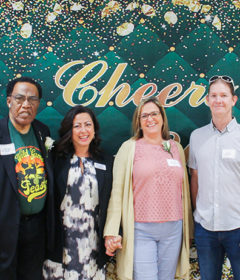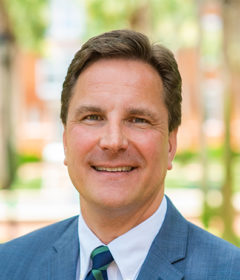Class of 2019: Kathrine Pulling and the Art of Stagecraft
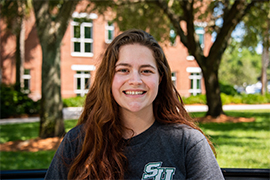
“Game of Thrones,” the epic fantasy television series, created a hubbub recently when fans spotted what appeared to be a Starbucks cup in a castle dining hall scene. That wouldn’t have happened on Katie Pulling’s watch.
The 2019 Stetson grad earned her degree in theatre arts with a minor in education, but theater fans at Stetson rarely, if ever, saw Pulling onstage. Instead, given that she is a properties master, theatergoers saw only her handiwork.
“If a play is about a family living in a shack somewhere, they’re probably not going to have organic ketchup from Whole Foods, but they might have ketchup packets from McDonald’s,” Pulling says. “It’s those choices that makes the difference between creating a scene that’s real and just throwing something on stage. I’m trying to make the story come to life, trying to be true to it and be as accurate as possible.”
It’s such attention to detail that drew Pulling to study under Krista Franco, M.F.A., Assistant Professor of Theatre Arts, at Stetson and during summers at Endstation Theatre Company in Lynchburg, Va., which Franco co-founded in 2006.
It’s such attention to detail that led Pulling to painstakingly re-create an ottavino spinet, a 17th-century harpsichord, for the April 2019 production of Oscar Wilde’s “The Importance of Being Earnest” by Stetson’s Second Stage Theatre. The ottavino was the centerpiece of Pulling’s senior project, titled “19th Century London in 21st Century DeLand: Properties Design of ‘The Importance of Being Earnest.’ ”
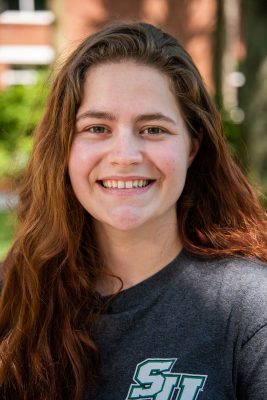
It’s such attention to detail that twice earned Pulling the James Campbell Wright Award for Excellence in Technical Theatre, presented annually by Stetson’s Department of Communications and Theatre Arts. Pulling’s ottavino senior project also earned her third place in the Properties Design/Construction Competition at the Southeastern Theatre Conference.
While attending high school in Naples, Pulling played sax in the band but she also discovered passions for music instrument repair and theater. She had attended saxophone workshops at Stetson but was undecided about her college path when she scheduled a Shadow Stetson Day with Franco.
“I observed one of her classes and I also observed a theater workshop she was supervising,” Pulling says. “She was actually the reason I decided to come to Stetson. I wanted to learn from her.”
Still, Pulling hadn’t decided on a behind-the-scenes career in theater until she took Franco’s Stagecraft class, “which is basically principles of backstage theater, all the technical stuff,” Pulling says. “I realized properties is what I wanted to do. I liked that she has a close attention to detail, and that is something you need in properties.”
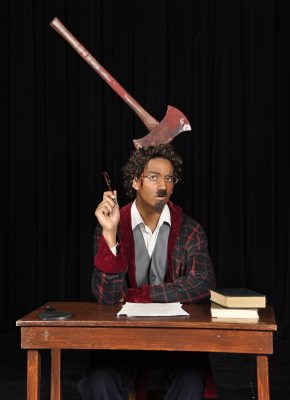
Working in props, Pulling says, “You do carpentry, you do painting, you do large-scale painting, you do really detailed painting, you do upholstery, you do welding, you do soldering. There’s the management side of it. You do your own budgeting. So it’s kind of every department rolled into one.”
Even her non-theatrical classes were important, Pulling says: “You have to learn a lot about everything. If I take a religion class, maybe I’ll do a show with a character that is that religion. So I have to know those intricacies as best I can, because visually I’m representing those people on stage.”
If, as Shakespeare wrote, all the world – and not just the theater itself – is a stage, then Franco lived up to that credo for Pulling.
“I sat in her office many a day and had talks about ‘What am I doing with my life? Is this what I want to do? Is this right?,’ ” Pulling says. “The theater programs at so many schools become their own little worlds and people who aren’t a major or a minor aren’t really welcome. It’s so not like that at Stetson. That has to do with the faculty and the way they treat everyone equally and welcoming. You can talk to Krista whether it’s school-related or not. As a professor she is everything that Stetson talks about being or wanting to be rolled up into one person.”
At the Endstation Theatre Company that Franco co-founded, Pulling served one summer as an apprentice stage manager, and last summer she served as their properties master for the entire season. The troupe was active in the Lynchburg community, Pulling says, adding, “I like companies that get involved in their communities. That’s really important to me.”
Pulling also served as stage manager for a production of Vero Beach Opera under the tutelage of Russell Franks, Director of Stetson Opera Theater and a frequent director with the Vero Beach company.
As for her Stetson experiences outside the classroom, Pulling laughs and says, “I spent most of my time in the theater.”
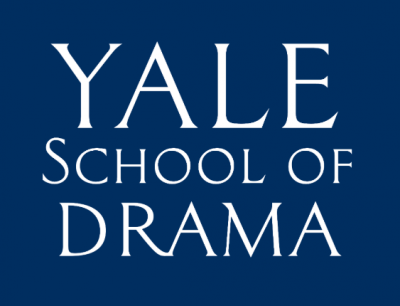
She served two years as the president of the Stetson chapter of Theta Alpha Phi, the national theater honor society, and she served as manager and head coach of the Stetson Improv Players. She volunteered in the drama department of DeLand High School, and taught improv to residents of Grand Villa of DeLand, a retirement and assisted living community.
“It was cool because I went from teaching improv to my peers, to teaching it to high school students, to teaching it to the exact opposite on the spectrum,” Pulling says.
This summer Pulling will work with the Des Moines Opera as its properties stage supervisor, helping the troupe present four productions. Then she’s off to study at the Yale School of Drama in its Technical Internship Certificate Program.
She’s considering pursuing a graduate degree, but her goal is to “start an educational theater company teaching technical theater to a wide array of ages,” she says. “A lot of people tend to just see what’s on stage instead of thinking about how much goes into it. I think there’s a huge deficit in theater education. It’s all acting camps and there are very few places that provide opportunities to learn the technical side of theater.”
— Rick de Yampert


